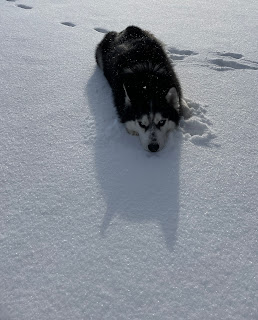This creative development question is my topic. It came to me because years ago, a friend who is now a very successful author decided to write her second book. She sat up in our local writer's meeting and said, "I want to make readers cry. I'm going to try to write a book that makes 'em cry." It stuck with me. She's continued with having a goal for each book - something that stretches her skills and at the time, I was envious of and intimidated by the conscious decision to attempt something like that. What if you failed? I've since gotten over that fear of failure silliness. New skills are new skills whether you execute them perfectly the first time or not. In the spirit of 'what doesn't kill me makes me stronger' nothing new that's attempted is ever wasted.
At the moment, however, I have only one goal. Recover from burn out and finish the book I'm working on so I can write the book that was due a few years ago. My goals for books are currently in a really simplistic place. I want to tell a competent, compelling story. I'll worry about technique after. I need the story to feel right before I can fuss with heightening whatever skill I stumbled on accidentally - which is what usually happens. As an example, the book I'm currently working on requires that I learn how to handle a little bit of horror technique. I have no clue whether I'm doing it correctly. That will be for readers to decide. I'm *trying*. But it wasn't a conscious decision. It was simply what this story needed. It's the story that intrigued me enough to write and as I wrote it, the story revealed to me that it needed a reasonably high creep factor. This was a skill I did not (and to this day, may or may not) possess. But yes. I sought out a class. A couple, in fact.
My next book requires me to tackle a theme that isn't entirely my forte. We've been eyeing one another, that theme and I. There's been research and some free writing around the associations and emotional loads. Now lets see if it will mature into a plot that won't bore readers to death. If I don't stick the landing, so what? I'll still have learned something that I'll carry forward into the next story. And the next.
As a part of the recovery process, I'm doing my best to keep writing as nourishing as possible. Some days that means fun. Some days that means challenging. Some days it means trying things I've never done before - with the awareness that such experimentation might not end up being ready for anyone else's eyes. That's okay. I look at it as building strength. It's also a useful way to break up writerly monotony. Experiment builds upon experiment, and eventually, there a new skill is likely to emerge.
Planning for specific skills for each book? No. Not yet. I'm not there yet. I aspire to be. Working on it. For right now, the stories lead the way. What they want, I attempt to deliver. Succeed or fail, I at least give it my best shot and trust I'm learning from the process. I expect that at some point, I'll learn enough that I'll be able to declare an objective like "I want to make them cry!" and be able to rise to the challenge. But for today, finishing is good enough.










